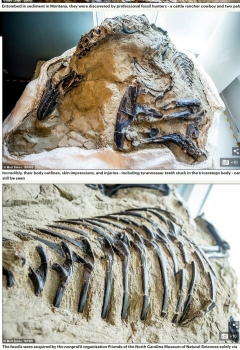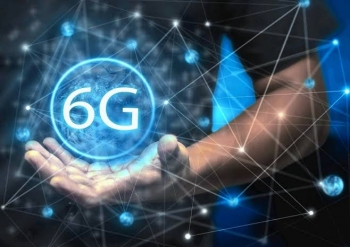News And PoliticsSports And FitnessCommunications And EntertainmentRelationship And MarriageBusiness And MoneyScience And TechnologyArts And EducationLawHealth And LifestyleReligion And PrinciplesOthersIT And Computer ScienceVehicles And MobilityStories And PoemsMotivationalsFamily And HolidaysSportsSocial SciencesNewsEngineeringPersonal Care And BeautyFood And KitchenPoliticsAgricultureHobbies And HandiworksSecurityReligionScience
Sammyesx
Scientist : Science And Sport Enthusiasts
Wants to meet Just Friends
Articles
2967
Followers
32
profile/2432FB_IMG_15987307273186901.jpg
Sammyesx

Complete Skeleton Of Duelling Dinosaurs From 67 Million Years Ago Revealed
~3.7 mins read
First complete T-rex skeleton locked in a fight to the death with a Triceratops is finally revealed to the public after being buried for 67 million years in Montana
The 'Duelling Dinosaurs' were found in 2006 in Montana, US by a cattle rancher cowboy and two of his friends. 67 million-year-old remains of T-rex and Triceratops reveal a ferocious battle to the death that's frozen in time. Following a protracted legal battle over ownership the remains have been sold to the North Carolina Museum
The world's first ever complete T-rex skeleton, which became buried in sediment after a deadly duel with a Triceratops 67 million years ago, has been revealed by scientists.
The Tyrannosaurus rex and Triceratops horridus – nicknamed the 'Dueling Dinosaurs' – are preserved together in what is thought to be a predator-prey encounter, where both fought to the death.
Body outlines, skin impressions and injuries – including Tyrannosaur teeth stuck in the Triceratops' body – can still be seen 67 million years after the ferocious battle.
Each of the remains have only been seen by only a few dozen people since they were discovered in 2006 in Montana, US, by professional fossil hunters.
It took years to extract the 14-ton skeletons and arrange their purchase, by the non-profit Friends of the North Carolina Museum of Natural Sciences for an undisclosed sum.
The group has donated them to North Carolina Museum of Natural Sciences, in Raleigh, North Carolina, which is due to start building a dedicated exhibition for them next year.
The Dueling Dinosaurs, which have not yet been studied, have been described as 'one of the most important paleontological discoveries of our time'.
'This fossil will forever change our view of the world's two favourite dinosaurs,' said Dr Lindsay Zanno, head of palaeontology at the North Carolina Museum of Natural Sciences.
'The preservation is phenomenal, and we plan to use every technological innovation available to reveal new information on the biology of the T. rex and Triceratops.
'We have not yet studied this specimen – it is a scientific frontier.'
The T-rex includes the only 100 per cent complete T-rex ever found – even better preserved than Sue, housed at the Field Museum of Natural History in Chicago, Illinois.
'Dueling Dinosaurs' tyrannosaur is a young individual, not yet fully grown,' Dr Zanno told MailOnline. 'By comparison Sue is a large, skeletally mature individual of T-rex.
'However, our tyrannosaur is 100 per cent complete, preserving every bone in the body on both sides in life position [while] Sue is about 85 per cent complete.'
The 'dueling' tyrannosaur also has skin impressions – fossilised remains of skin surfaces – which are extremely rare.
'There is not, to my knowledge, evidence of skin preservation on Sue,' said Dr Zanno.
The Dueling Dinosaurs' carcasses have remained entombed within sediment from the Montana hillside where they were discovered by the professional fossil hunters – a cattle rancher and two of his friends.Because of these rare burial conditions, each bone is in its natural position and museum scientists will have access to biological data that is typically lost in the excavation and preparation processes.
A rancher, his friend and his cousin found the fossils in 2006, and it is reported they came to a deal with the landowners.
The skeletons are worth millions of dollars and were the subject of a court battle over who owned them after their discovery in 2006.
In June 2020, a US appeals court ruled the fossils belong to the owners of the land's surface rights, not the owners of the mineral rights.
The Dueling Dinosaurs went to auction in 2013 at Bonhams in New York, but no bid met the reserve price of $6 million.
During years of negotiations, the fossil was reportedly locked away in labs or warehouses.
But thanks to donors, the non-profit Friends of the North Carolina Museum of Natural Sciences has now bought them on behalf of the museum.
The museum, in downtown Raleigh, said design is nearing completion on a 'globally unique, behind-the-scenes visitor experience'.
'The museum is thrilled to have the unique opportunity to house and research one of the most important paleontological discoveries of our time,' said Dr Eric Dorfman, director and CEO of the museum.
'Not only are we able to uncover unknown details of these animals' anatomy and behaviour, but our new dedicated facility and educational programs will allow us to engage with audiences locally, across North Carolina, and worldwide.'
profile/2432FB_IMG_15987307273186901.jpg
Sammyesx

China Sends World's First 6G Test Satellite Into Orbit
~0.5 mins read
China has successfully launched the world's first 6G satellite into space to test the technology.
It went into orbit along with 12 other satellites from the Taiyuan Satellite Launch Center in the Shanxi Province.
High-speed technology will be trialled, which will be one of the core elements of sixth-generation communications.
The satellite also carries technology which will be used for crop disaster monitoring and forest fire prevention.
The new Technology is said to be 100 times faster than 5G.
Advertisement

Link socials
Matches
Loading...
